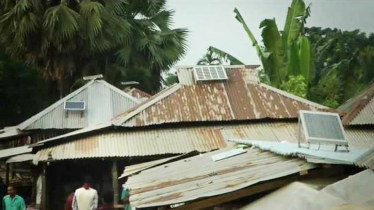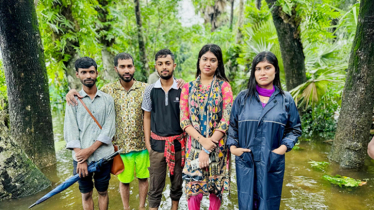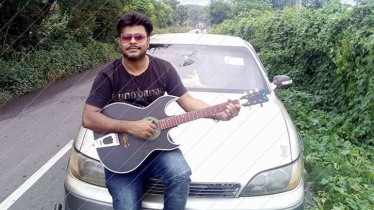
Photo: Courtesy
The country has been celebrating Pahela Boishakh, the first day of Bengali New Year 1430, today (14 April) amid festivity upholding the cultural values and rituals of the Bangladeshis.
The first day of the Bengali calendar will be celebrated following its all rituals at the venue along with bringing out the traditional 'Mangal Shovajatra' organized by the Fine Arts Faculty of Dhaka University.
The Bengali new year festival is also going to be celebrated at its traditional venue at Ramna Batamul.
The main procession of the Mangal Shovgajatra started from the Fine Arts Institute of Dhaka University.
The Mangal Shovajatra reflects various aspects of Bengali culture with its colorful floats, masks, and various symbols. Every year, the procession carries a basic concept of resistance and protest against all kinds of evil. It expresses a desire for the destruction of all kinds of evil. People are urged to pursue truth and beauty.
Mangal Shovajatra of the Bengali New Year 1430
Like every year, Dhaka University's fine arts premises are getting ready for Mangal Shovajatra, one of the best festivals for Bengalis. The theme of this year's Mangal procession is from the verse of Rabindranath Tagore's song, "Barisho Dhora Majhe Shantir Bari".
“Stop the war and let peace return to the world” call will be made to the whole world from the Mangal Sovajatra. The entire world is in a state of war and chaos as the corona epidemic continues.
May the new year bring a "turn of peace" for the world and humanity, stop the war, and return peace - the students of the Fine Arts Faculty of Dhaka University are spending day and night working hard and sleepless nights to spread this message to people's minds.
The three-day programs will include the Mangal Shovajatra as part of the celebration of the new year. On the last day of the year (Thursday), there will be an event of Chaitra Sangkranti. In the evening, there will be a cultural event for the students of Charukala in Bakultala. On Friday, Pahela Boishakh, there will be a Mangal Shovajatra, and on Saturday evening, there will be a drama called 'Nachmahal', in which the students will participate in.
Due to the ongoing holy month of Ramadan, Pahela Boishakh will be celebrated on a limited scale.
People are expected to join the "Nabo Barsho" festivities across the country, particularly in the capital city.
Pahela Boishakh is one of the most colourful festivals through which the Bangalis bid farewell to the old year and welcome the New Year.
On this occasion, people from all walks of life wear traditional Bengali dresses.
Young women wear white sarees with red borders and adorn themselves with bangles, flowers, and tips, while men wear white pajamas and panjabi or kurta.
The government has drawn up an elaborate programme. The Mongol Shovajatra will be brought out at divisional, district and upazila levels to reach the traditional programme to the grassroots as it has earned the international recognition.
However, business communities, especially in the rural areas, are ready to open their traditional 'Halkhata', new account books. On the day traders also offer sweets to customers.
President Abdul Hamid and Prime Minister Sheikh Hasina are expected to issue separate messages greeting the countrymen on the eve of the Pahela Boishakh.
All secondary schools and colleges of the country are asked to celebrate Pahela Boishakh.
"The educational institutions across the country must organise student rallies in the morning as part of the celebration of Pahela Boishahk," said the Directorate of Secondary and Higher Education (DSHE) on Wednesday (12 April).
Mangal Shobhajatra: The Beginning
Although the history of celebrating Pahela Boishakh dates back several years, the history of Mangal Shovajatra is not that old. Mangal Shovajatra first started in Jashore on Pahela Boishakh in 1985 when the country was under martial law. The purpose was to unite all people by presenting the culture of the country to them. In that procession, people prayed for the destruction of evil and the arrival of good fortune. The initiative was taken by the renowned artist Mahbub Jamal Shamim. After completing his education at the Institute of Fine Arts at Dhaka University, he went to Jashore and founded an organization called "Charupith."
However, he did not confine himself to Jashore until the end and continued to participate in Mangal Shovajatra in Jashore. In 1989, the Ananda Shovajatra was started by the Institute of Fine Arts in Dhaka on the Pohela Boishakh. It was initially named the 'Ananda Shobhajatra'. It was done keeping in mind the then-prevailing political situation. Later on, it became famous as 'Mangal Shobhajatra.'The main idea of the procession was the destruction of undemocratic power. At that time, the anti-Ershad movement was intense. At that time, everyone gathered together in one platform.
The Mangal Shovajatra is open to everyone. Cross-section people participate in the Shovajatra.
Halkhata: The Traditional Festival of Old Dhaka's Traders
On the eve of Bengali New Year, the celebration of the closing old accounts and opening new accounts, along with entertainment and formalities, is called Halkhata.
Although not as grand as before, the traders of Old Dhaka's Banglabazar, Tantibazar, Laxmibazar, Shakharibazar, and Islampur still open their accounts in the new year by closing the previous one.
However, the charm of Halkhata has been lost in recent days. Now, consumers are not invited through letters or cards. Modernity has engulfed this old tradition of the Bengali. Now consumers are invited through phone calls, messages, e-mails, etc. Many people now make purchases on cards and pay dues through banking channels.
In the Shakharibazar, Tantibazar, and Lakshibazar areas of the capital, traders were found cleaning shops on the occasion of the New Year. It has been reported by several jewelry shops in Tantibazar, Old Dhaka, were decorated with flowers. A new account will be available in the store instead of the old one. New accounts will be set up in the new year. Regular customers will be entertained with sweets on the first day. There will also be small gifts. However, since this is Boisakh on the day of fasting, Halkhata will not be as crowded as before.
TDM/MI








